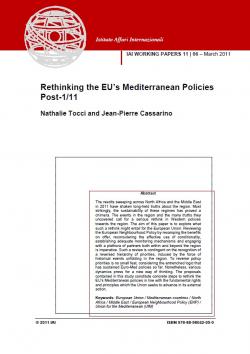Rethinking the EU's Mediterranean Policies Post-9/11
The revolts sweeping across North Africa and the Middle East in 2011 have shaken long-held truths about the region. Most strikingly, the sustainability of these regimes has proved a chimera. The events in the region and the many truths they uncovered call for a serious rethink in Western policies towards the region. The aim of this paper is to explore what such a rethink might entail for the European Union. Reviewing the European Neighbourhood Policy by revamping the benefits on offer, reconsidering the effective use of conditionality, establishing adequate monitoring mechanisms and engaging with a plethora of partners both within and beyond the region is imperative. Such a review is contingent on the recognition of a reversed hierarchy of priorities, induced by the force of historical events unfolding in the region. To reverse policy priorities is no small feat, considering the entrenched logic that has sustained Euro-Med policies so far. Nonetheless, various dynamics press for a new way of thinking. The proposals contained in this study constitute concrete steps to rethink the EU’s Mediterranean policies in line with the fundamental rights and principles which the Union seeks to advance in its external action.
-
Details
Roma, Istituto Affari Internazionali, March 2011, 28 p. -
Issue
11|06 -
ISBN/ISSN/DOI:
978-88-98042-05-0
1. Introduction
2. Tracing the 180-degree turn in EU policies towards the Mediterranean: 2001-2011
2.1 9/11 and its policy after-shocks: the birth of the ENP
2.2 Selective engagement with opposition actors in the south
2.3 Getting cold feet on democracy and human rights: the UfM and migration/border management
3. The revolts and their implications for EU policy: A new 180-degree turn?
3.1 Acknowledging the need for a shake-up
3.2 The way forward: The good news
3.3 The way forward: The challenges
4. Conclusions
References



